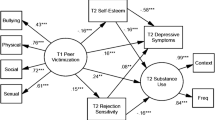Abstract
This study examined the relationship over time involving three types of experiences with peers (amount of contact with friends, intimacy with best friend, rejection by peers) and two indices of psychological adjustment (self-perceived social acceptance and depressive affect) using longitudinal and causal analytic procedures developed within the life stress paradigm. Data were collected twice on a sample of 73 young adolescents, with a 6-month interval between measurements. The results provide partial support for a model of reciprocal influences between experiences with peers and adaptation, since adaptation was predictive of change over time in peer experiences in several instances as well as vice versa. Implications for intervention and further research are presented.
Similar content being viewed by others
References
Aronson, E., Stephan, C., Sikes, J., Blaney, N., & Snapp, M. (1978).The jigsaw classroom. Beverly Hills, CA.: Sage.
Asher, S. R., & Coie, J. D. (Eds.), (in press).Peer rejection in childhood. New York: Cambridge University Press.
Berndt, T. J. (1982). The features and effects of friendship in early adolescence.Child Development, 53, 1447–1460.
Berndt, T. J., & Hawkins, J. (1984).Friendship interview. Unpublished manuscript, Purdue University.
Casey, R. J., & Berman, J. S. (1985). The outcome of psychotherapy with children.Psychological Bulletin, 98, 388–400.
Cohen, L., Burt, C. E., & Bjorck, J. P. (1987). Life stress and adjustment: Effects of life events experienced by young adolescents and their parents.Developmental Psychology, 23, 583–592.
Cohen, J., & Cohen, P. (1983).Applied multiple regression/correlation analysis for the behavioral sciences (2nd ed.). Hillsdale, NJ: Erlbaum.
Cohen, S., & Wills, T. A. (1985). Stress, social support, and the buffering hypothesis.Psychological Bulletin, 98, 310–357.
Erikson, E. (1963).Childhood and society. New York: Norton.
Faust, J., Baum, C., & Forehand, R. (1985). An examination of the association between social relationships and depression in early adolescence.Journal of Applied Developmental Psychology, 6, 291–297.
Feldman, S. S., Rubenstein, J. L., & Rubin, C. (1988). Depressive affect and restraint in early adolescents: Relationships with family structure, family process and friendship support.Journal of Early Adolescence, 8, 279–296.
Furman, W., & Robbins, P. (1985). What's the point? Issues in the selection of treatment objectives. In B. H. Schneider, K. H. Rubin, & J. E. Ledingham (Eds.),Children's peers relations: Issues in assessment and intervention (pp. 41–54). New York: Springer-Verlag.
Harter, S. (1983a). Developmental perspectives on the self-system. In P. H. Mussen & E. M. Hetherington (Eds.),Handbook of child psychology: Socialization, personality, and social development (Vol. 4, pp. 275–386). New York: Wiley.
Harter, S. (1983b).Supplementary description of the Self-Perception Profile for Children. Unpublished manuscript, University of Denver.
Kovacs, M. (1983).The Children's Depression Inventory. A self-rated depression scale for school aged youngsters. Unpublished manuscript.
Parker, J. G., & Asher, S. R. (1987). Peer relations and later personal adjustment: Are lowaccepted children at risk?Psychological Bulletin, 102, 357–389.
Peterson, L., Mullins, L., & Ridley-Johnson, R. (1985). Children depression: Peer reactions to depression and life stress.Journal of Abnormal Child Psychology, 13, 597–609.
Puig-Antich, J., Lukens, C., Davies, M., Goetz, D., Brenan-Quattrock, J., & Todak, G. (1985). Psychosocial functioning in prepubertal major depressive disorders.Archives of General Psychology, 42, 500–507.
Rook, K. (1985). The functions of social bonds: Perspectives from research on social support, loneliness and social isolation. In I. Sarason & B. G. Sarason (Eds.),Social support: Theory, research and applications (pp. 243–267). The Hague: Martinus Nijhof.
Swearingen, E. M., & Cohen, L. H. (1985). Life events and psychological distress: A prospective study of young adolescents.Developmental Psychology, 21, 1045–1054.
Youniss, J. (1980).Parents and peers in social development: A Sullivan-Piaget perspective. Chicago: University of Chicago Press.
Author information
Authors and Affiliations
Rights and permissions
About this article
Cite this article
Vernberg, E.M. Psychological adjustment and experiences with peers during early adolescence: Reciprocal, incidental, or unidirectional relationships?. J Abnorm Child Psychol 18, 187–198 (1990). https://doi.org/10.1007/BF00910730
Revised:
Issue Date:
DOI: https://doi.org/10.1007/BF00910730




